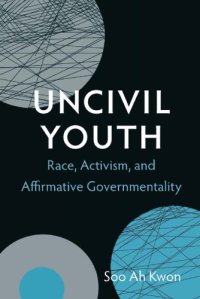
Ebook: Uncivil Youth: Race, Activism, and Affirmative Governmentality
Author: Soo Ah Kwon
- Year: 2013
- Publisher: Duke University Press
- Language: English
- pdf
In Uncivil Youth, Soo Ah Kwon explores youth of color activism as linked to the making of democratic citizen-subjects. Focusing attention on the relations of power that inform the social and political practices of youth of color, Kwon examines how after-school and community-based programs are often mobilized to prevent potentially "at-risk" youth from turning to "juvenile delinquency" and crime. These sorts of strategic interventions seek to mold young people to become self-empowered and responsible citizens. Theorizing this mode of youth governance as "affirmative governmentality," Kwon investigates the political conditions that both enable youth of color to achieve meaningful change and limit their ability to do so given the entrenchment of nonprofits in the logic of a neoliberal state. She draws on several years of ethnographic research with an Oakland-based, panethnic youth organization that promotes grassroots activism among its second-generation Asian and Pacific Islander members (ages fourteen to eighteen). While analyzing the contradictions of the youth organizing movement, Kwon documents the genuine contributions to social change made by the young people with whom she worked in an era of increased youth criminalization and anti-immigrant legislation.
Endorsements:
"Providing a model of activist ethnographic research, Soo Ah Kwon constructively engages with the activism of the youth of color whom she studies without oversimplifying the contradictory circumstances within which they work. Kwon respects their intellectual analyses and political contributions. At the same time, she demonstrates that youth organizing is often shaped by the very discourses that it seeks to resist. Uncivil Youth is a compelling examination of the intersections of youth organizing, governmentality, and the 'nonprofit industrial complex.'" — Andrea Smith, author of, Native Americans and the Christian Right: The Gendered Politics of Unlikely Alliances
"This is a wonderful ethnographic study of Asian and Pacific Islander youth activism in Oakland and the youth organizing movement that has been likened to a 'new civil rights movement.' Soo Ah Kwon astutely uncovers what makes possible the 'power of the youth' at a moment when grassroots organizing has been reshaped by nonprofit organizations and neoliberal governance. The book interrogates how the category of 'youth of color' has been absorbed into depoliticized programs for self-help, as well as how young activists challenge the state's discourse of democratic citizenship and the criminalization of immigrant and refugee youth. This is a must-read for scholars, students, youth workers, activists, and general audiences alike." — Sunaina Marr Maira, author of, Missing: Youth, Citizenship, and Empire after 9/11
Endorsements:
"Providing a model of activist ethnographic research, Soo Ah Kwon constructively engages with the activism of the youth of color whom she studies without oversimplifying the contradictory circumstances within which they work. Kwon respects their intellectual analyses and political contributions. At the same time, she demonstrates that youth organizing is often shaped by the very discourses that it seeks to resist. Uncivil Youth is a compelling examination of the intersections of youth organizing, governmentality, and the 'nonprofit industrial complex.'" — Andrea Smith, author of, Native Americans and the Christian Right: The Gendered Politics of Unlikely Alliances
"This is a wonderful ethnographic study of Asian and Pacific Islander youth activism in Oakland and the youth organizing movement that has been likened to a 'new civil rights movement.' Soo Ah Kwon astutely uncovers what makes possible the 'power of the youth' at a moment when grassroots organizing has been reshaped by nonprofit organizations and neoliberal governance. The book interrogates how the category of 'youth of color' has been absorbed into depoliticized programs for self-help, as well as how young activists challenge the state's discourse of democratic citizenship and the criminalization of immigrant and refugee youth. This is a must-read for scholars, students, youth workers, activists, and general audiences alike." — Sunaina Marr Maira, author of, Missing: Youth, Citizenship, and Empire after 9/11
Download the book Uncivil Youth: Race, Activism, and Affirmative Governmentality for free or read online
Continue reading on any device:

Last viewed books
Related books
{related-news}
Comments (0)